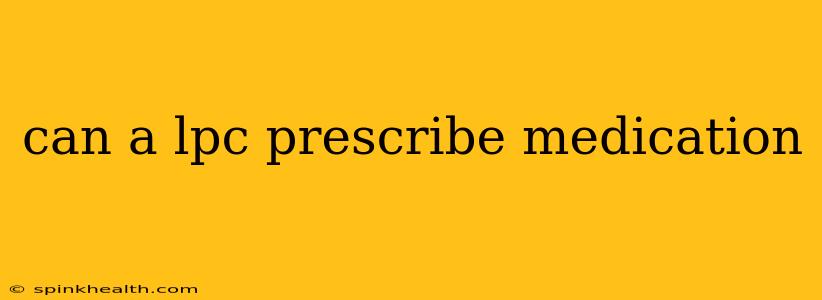Can a Licensed Professional Counselor (LPC) Prescribe Medication? The Short Answer: Usually No.
The story of mental healthcare access often involves navigating a complex web of professionals. Imagine Sarah, struggling with anxiety. She seeks help, and her journey leads her to a Licensed Professional Counselor (LPC). Sarah connects with her LPC, finding solace in therapy sessions. But as her anxiety deepens, she wonders, "Can my LPC prescribe medication?" The answer, in most cases, is no.
This isn't to diminish the incredible value LPCs bring to mental healthcare. LPCs are trained to provide psychotherapy, counseling, and support, using various techniques to help clients work through their challenges. They're experts in building therapeutic relationships, identifying coping mechanisms, and guiding individuals towards self-discovery and improved mental wellbeing.
However, prescribing medication requires a different level of training and licensing. That's where the distinction lies. The authority to prescribe medications typically falls under the purview of medical doctors (MDs), psychiatrists (MDs specializing in mental health), and in some states, physician assistants (PAs) and nurse practitioners (NPs) with the appropriate certifications.
Let's delve into some frequently asked questions to clarify the roles of LPCs and prescribing professionals:
What is the difference between an LPC and a psychiatrist?
This is a crucial distinction. While both work in mental health, their roles are quite distinct. Psychiatrists are medical doctors specializing in diagnosing and treating mental illnesses. Their training includes extensive medical education, allowing them to prescribe medication and manage the medical aspects of mental health conditions. LPCs, on the other hand, focus on therapeutic interventions, providing talk therapy and other counseling techniques to address emotional, behavioral, and relational issues.
Can an LPC recommend medication?
While an LPC cannot prescribe medication, they can certainly recommend that a client see a psychiatrist or other medical professional for a medication evaluation. This is often a collaborative process. If an LPC believes medication would benefit their client, they'll likely discuss this possibility, explain the potential benefits and risks, and provide a referral to the appropriate medical professional. Think of it as a team approach: the LPC handles the therapy, while the psychiatrist manages the medication.
What if my LPC can prescribe medication?
In a few rare circumstances, there might be exceptions to the rule. Some states may allow LPCs to prescribe medication under specific conditions, perhaps with additional training or certification. However, this is uncommon. If you are in such a situation, it's crucial to verify the LPC's credentials and the legality of their prescribing practices within your state. Your state's licensing board is the best resource for this information.
What are the benefits of collaborative care?
Collaborative care, where LPCs and prescribing professionals work together, offers significant advantages. The client receives both therapeutic support (from the LPC) and medication management (from the psychiatrist or other prescribing professional), creating a holistic approach to mental healthcare. This integrated model can lead to better outcomes and a more comprehensive treatment plan.
How can I find a psychiatrist or other prescribing professional?
Finding a psychiatrist or other healthcare provider who can prescribe medication usually starts with your insurance provider's directory. You can also search online for psychiatrists in your area, check with your primary care physician for referrals, or contact your local mental health association.
In conclusion, while LPCs are invaluable in providing therapeutic support, the prescribing of medication typically remains the domain of medical professionals. The collaborative relationship between LPCs and prescribing professionals is a powerful tool in achieving comprehensive mental healthcare. Sarah's journey might involve both her LPC for therapy and a psychiatrist for medication, illustrating the best of a team approach to managing mental health.

